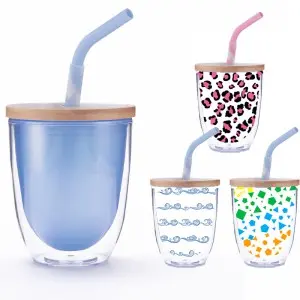In recent years, the global push for sustainability has gained significant momentum, driven by growing environmental awareness and the urgent need to address plastic pollution. As industries strive to adopt eco-friendly practices, the market for recycled plastic products has expanded rapidly. One standout innovation in this space is the GRS (Global Recycled Standard) certified recycled plastic drinking cup. This blog post will explore the benefits, market trends, and future potential of GRS recycled plastic drinking cups, highlighting their role in promoting a circular economy and sustainable consumption.

Understanding the Global Recycled Standard (GRS)
The Global Recycled Standard (GRS) is an international certification that ensures the responsible use of recycled materials in products. Established to promote transparency and sustainability, GRS covers several critical aspects, including:
Recycled Content Verification: Ensuring that products contain a specified percentage of recycled materials.
Traceability: Tracking the journey of recycled materials from source to final product.
Environmental and Social Responsibility: Promoting sustainable manufacturing practices, fair labor conditions, and worker safety.
Chemical Restrictions: Limiting the use of harmful substances in the recycling process.
By adhering to these stringent standards, GRS-certified products not only reduce environmental impact but also offer a higher level of quality and transparency.
The Benefits of GRS Recycled Plastic Drinking Cups
GRS-certified recycled plastic drinking cups offer numerous advantages over traditional plastic cups, making them an attractive choice for both consumers and businesses.
Environmental Impact Reduction
Waste Diversion: By using post-consumer recycled materials, these cups prevent plastic waste from ending up in landfills or oceans.
Carbon Emission Reduction: The production of recycled plastic consumes less energy and generates fewer greenhouse gases compared to virgin plastic.
Market Differentiation and Competitive Advantage
GRS certification sets products apart by demonstrating a commitment to sustainability. This appeals to environmentally conscious consumers and businesses, creating a competitive edge.
Access to new markets: Many regions now mandate the use of recycled materials in products, making GRS certification crucial for compliance.
Economic Benefits
Cost Savings: Recycled plastic is often cheaper than virgin plastic, reducing production costs.
Increased Demand: The growing market for sustainable products ensures high demand for GRS-certified recycled plastic cups.
Quality and Safety
GRS-certified products undergo rigorous testing and quality control, ensuring they meet high standards of safety and performance.
Market Trends and Future Prospects
The market for GRS-certified recycled plastic products is experiencing significant growth, driven by increasing environmental awareness and regulatory pressures. The global GRS-certified recycled plastic market was valued at approximately USD 34.5 billion in 2023 and is projected to reach USD 75.8 billion by 2032, growing at a CAGR of 9.1%. This growth is fueled by several factors:
Technological Advancements
Innovations in recycling technologies, such as advanced sorting and cleaning processes, have improved the efficiency and quality of recycled plastic production.
Expanding Applications
While packaging remains a primary market for recycled plastic, industries like automotive, construction, and electronics are increasingly exploring its applications.
Consumer Demand
Consumers are becoming more aware of the environmental impact of plastic waste and are actively seeking sustainable alternatives.
Government Incentives
Many governments offer tax incentives and subsidies for businesses that use recycled materials, further driving market growth.
Product Details and Specifications
GRS-certified recycled plastic drinking cups are designed to meet high standards of quality and functionality. Here are some key specifications:
Material: 100% recycled post-consumer polystyrene (RPS) or other recycled polymers.
Capacity: Available in various sizes, typically ranging from 300ml to 500ml.
Durability: Recycled plastic is strong and durable, making it suitable for repeated use.
Customization: Cups can be customized with different colors, logos, and straw designs to meet specific branding needs.
Safety: GRS certification ensures that these cups are free from harmful chemicals and meet stringent safety standards.
Case Studies and Success Stories
Several companies have successfully implemented GRS standards in their production processes, achieving significant benefits. For example, a leading LDPE recycling factory upgraded its processes to obtain GRS certification, resulting in a 25% enhancement in credibility and entry into new markets like the EU and North America. This success highlig
hts the transformative potential of GRS implementation.
Challenges and Solutions
While the benefits of GRS certification are clear, there are challenges in achieving and maintaining compliance:
Contamination: Ensuring the purity of recycled materials requires advanced sorting and cleaning technologies.
Supply Chain Complexity: Tracking recycled content through complex supply chains can be resource-intensive.
Cost: Achieving GRS certification involves costs related to audits, process upgrades, and compliance.
To overcome these challenges, companies can invest in advanced technologies, collaborate with certified suppliers, and leverage digital tools for tracking and documentation.
Conclusion
GRS-certified recycled plastic drinking cups represent a significant step forward in sustainable manufacturing and consumption. By promoting the use of recycled materials, ensuring transparency, and adhering to high environmental and social standards, these products contribute to a circular economy and a greener future. As consumer demand for sustainable products continues to grow, GRS-certified recycled plastic cups are poised to play a crucial role in reducing plastic waste and promoting environmental responsibility.
Join the movement towards sustainability by choosing GRS-certified recycled plastic drinking cups. Together, we can make a positive impact on our planet and pave the way for a more sustainable future.
Post time: Jan-24-2025